| Listing 1 - 10 of 10 |
Sort by
|
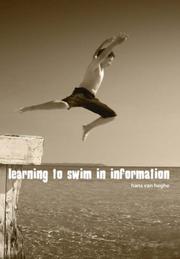
ISBN: 9781905823055 1905823053 Year: 2006 Publisher: Boortmeerbeek Penryn, Cornwall ICMS Group Ecademy Press
Abstract | Keywords | Export | Availability | Bookmark
 Loading...
Loading...Choose an application
- Reference Manager
- EndNote
- RefWorks (Direct export to RefWorks)
Human information processing --- Informatiestroom--Verwerking door de mens --- Information [Traitement de l'] chez l'homme --- Traitement de l'information chez l'homme --- Information retrieval --- 65.01 --- 65.01 Methods and methodology. Theory and practice of organization --- Methods and methodology. Theory and practice of organization --- Information processing, Human --- Data retrieval --- Data storage --- Discovery, Information --- Information discovery --- Information storage and retrieval --- Retrieval of information --- Bionics --- Information theory in psychology --- Perception --- Documentation --- Information science --- Information storage and retrieval systems --- Handbooks, manuals, etc.

ISBN: 128062437X 9786610624379 1402036701 1402036671 9048169232 Year: 2006 Volume: 8 Publisher: Dordrecht : Springer,
Abstract | Keywords | Export | Availability | Bookmark
 Loading...
Loading...Choose an application
- Reference Manager
- EndNote
- RefWorks (Direct export to RefWorks)
New Directions in Human Information Behavior, co-edited by Drs. Amanda Spink and Charles Cole provides an understanding of the new directions, leading edge theories and models in human information behavior. Information behavior is conceptualized as complex human information related processes that are embedded within an individual’s everyday social and life processes. The book presents chapters by an interdisciplinary range of scholars who show new directions that often challenge the established views and paradigms of information behavior studies. Beginning with an evolutionary framework, the book examines information behaviors over various epochs of human existence from the Palaeolithic Era and within pre-literate societies, to contemporary behaviors by 21st century humans. Drawing upon social and psychological science theories the book presents a more integrated and holistic approach to the understanding of information behaviors that include multitasking and non-linear longitudinal processes, individuals’ information ground, information practices and information sharing, digital behaviors and human information organizing behaviors. The final chapter of the book integrates these new approaches and presents an overview of the key trends, theories and models for further research. This book is directly relevant to information scientists, librarians, social and evolutionary psychologists. Undergraduate and graduate students, academics and information professionals interested in human information behavior will find this book of particular benefit.
Information retrieval. --- Information behavior. --- Cognitive styles. --- Human information processing. --- Information science. --- Computer science. --- Library science. --- Social sciences. --- Human geography. --- Personality. --- Social psychology. --- Computer Science. --- Computer Science, general. --- Human Geography. --- Library Science. --- Social Sciences, general. --- Personality and Social Psychology. --- Mass psychology --- Psychology, Social --- Human ecology --- Psychology --- Social groups --- Sociology --- Personal identity --- Personality psychology --- Personality theory --- Personality traits --- Personology --- Traits, Personality --- Individuality --- Persons --- Self --- Temperament --- Anthropo-geography --- Anthropogeography --- Geographical distribution of humans --- Social geography --- Anthropology --- Geography --- Behavioral sciences --- Human sciences --- Sciences, Social --- Social science --- Social studies --- Civilization --- Librarianship --- Library economy --- Bibliography --- Documentation --- Information science --- Informatics --- Science --- Information-seeking behavior --- Human behavior --- Communication --- Information literacy --- Library science --- Information processing, Human --- Bionics --- Information theory in psychology --- Perception --- Styles, Cognitive --- Cognition --- Intellect --- Personality and cognition --- Data retrieval --- Data storage --- Discovery, Information --- Information discovery --- Information storage and retrieval --- Retrieval of information --- Information storage and retrieval systems --- Information Technology --- Computer Science (Hardware & Networks) --- Cognitive styles --- Information retrieval --- Human information processing --- Information behavior --- Consciousness. --- Apperception --- Mind and body --- Philosophy --- Spirit
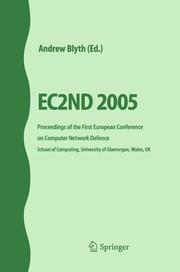
ISBN: 1281180599 9786611180591 1846283523 1846283116 Year: 2006 Publisher: London : Springer,
Abstract | Keywords | Export | Availability | Bookmark
 Loading...
Loading...Choose an application
- Reference Manager
- EndNote
- RefWorks (Direct export to RefWorks)
This book contains the proceedings of the First European Conference on Computer Network Defence which took place in December 2005 at the University of Glamorgan in the UK. The theme of the conference is the protection of computer networks; and it provides an opportunity for workers in this area to become better informed about recent research developments as well as to exchange valuable insights and opinions. The contributions are drawn from participants from a number of national and international organisations and cover the following topics: Computer Network Operations Computer Network Attack Network Application Security Web Security Vulnerability Management and Tracking Network Forensics Wireless and Mobile Security Cryptography Network Discovery and Mapping Network Security Intrusion Detection Systems Incident Response and Management Malicious Software Network Architectures and Management Legal and Ethical Issues The papers presented include contributions from leading figures in the field and are a valuable source of reference for both the researchers and the practitioners of computer network defence.
Computer networks --- Security measures --- Computer Communication Networks. --- Information Systems. --- Computers --- Information storage and retrieva. --- Management of Computing and Information Systems. --- Legal Aspects of Computing. --- Information Systems Applications (incl. Internet). --- Information Storage and Retrieval. --- Law and legislation. --- Information storage and retrieval. --- Information retrieval. --- Cyberspace --- Data retrieval --- Data storage --- Discovery, Information --- Information discovery --- Information storage and retrieval --- Retrieval of information --- Documentation --- Information science --- Information storage and retrieval systems --- Law and legislation --- Information storage and retrieval systems. --- Automatic data storage --- Automatic information retrieval --- Automation in documentation --- Computer-based information systems --- Data processing systems --- Data storage and retrieval systems --- Discovery systems, Information --- Information discovery systems --- Information processing systems --- Information retrieval systems --- Machine data storage and retrieval --- Mechanized information storage and retrieval systems --- Computer systems --- Electronic information resources --- Data libraries --- Digital libraries --- Information organization --- Information retrieval --- Computer communication systems. --- Management information systems. --- Computer science. --- Computers. --- Application software. --- Application computer programs --- Application computer software --- Applications software --- Apps (Computer software) --- Computer software --- Automatic computers --- Automatic data processors --- Computer hardware --- Computing machines (Computers) --- Electronic brains --- Electronic calculating-machines --- Electronic computers --- Hardware, Computer --- Cybernetics --- Machine theory --- Calculators --- Informatics --- Science --- EIS (Information systems) --- Executive information systems --- MIS (Information systems) --- Sociotechnical systems --- Information resources management --- Management --- Communication systems, Computer --- Computer communication systems --- Data networks, Computer --- ECNs (Electronic communication networks) --- Electronic communication networks --- Networks, Computer --- Teleprocessing networks --- Data transmission systems --- Digital communications --- Electronic systems --- Information networks --- Telecommunication --- Cyberinfrastructure --- Electronic data processing --- Network computers --- Communication systems --- Distributed processing
Book
ISBN: 1280611014 9786610611010 1402045832 Year: 2006 Volume: 10 Publisher: Dordrecht : Springer,
Abstract | Keywords | Export | Availability | Bookmark
 Loading...
Loading...Choose an application
- Reference Manager
- EndNote
- RefWorks (Direct export to RefWorks)
This book is an extension of the discussions presented in Blair’s 1990 book "Language and Representation in Information Retrieval", which was selected as the "Best Information Science Book of the Year" by the American Society for Information Science (ASIS). That work stated that the Philosophy of Language had the best theory for understanding meaning in language, and within the Philosophy of Language, the work of philosopher Ludwig Wittgenstein was found to be most perceptive. The success of that book provided an incentive to look more deeply into Wittgenstein’s philosophy of language, and how it can help us to understand how to represent the intellectual content of information. This is what the current title does, and by using this theory it creates a firm foundation for future Information Retrieval research. The work consists of four related parts. Firstly, a brief overview of Wittgenstein’s philosophy of language and its relevance to information systems. Secondly, a detailed explanation of Wittgenstein’s late philosophy of language and mind. Thirdly, an extended discussion of the relevance of his philosophy to understanding some of the problems inherent in information systems, especially those systems which rely on retrieval based on some representation of the intellectual content of that information. And, fourthly, a series of detailed footnotes which cite the sources of the numerous quotations and provide some discussion of the related issues that the text inspires.
Language and languages --- Information retrieval. --- Philosophy. --- Wittgenstein, Ludwig, --- Data retrieval --- Data storage --- Discovery, Information --- Information discovery --- Information storage and retrieval --- Retrieval of information --- Documentation --- Information science --- Information storage and retrieval systems --- Wei-tʻe-ken-ssu-tʻan, --- Wei-tʻe-ken-ssu-tʻan, Lu-te-wei-hsi, --- Wittgenstein, L. --- Vitgenshteĭn, L., --- Wei-ken-ssu-tʻan, --- Pitʻŭgensyutʻain, --- Vitgenshteĭn, Li︠u︡dvig, --- Weitegenshitan, --- Wittgenstein, Ludovicus, --- Vitgenshtaĭn, Ludvig, --- ויטגנשטיין, לודוויג --- 维特根斯坦, --- Computer science. --- Philosophy, modern. --- Linguistics --- Information storage and retrieva. --- Library science. --- Computer Science, general. --- Modern Philosophy. --- Linguistics, general. --- Philosophy of Language. --- Information Storage and Retrieval. --- Library Science. --- Librarianship --- Library economy --- Bibliography --- Informatics --- Science --- Modern philosophy --- Information storage and retrieval systems. --- Automatic data storage --- Automatic information retrieval --- Automation in documentation --- Computer-based information systems --- Data processing systems --- Data storage and retrieval systems --- Discovery systems, Information --- Information discovery systems --- Information processing systems --- Information retrieval systems --- Machine data storage and retrieval --- Mechanized information storage and retrieval systems --- Computer systems --- Electronic information resources --- Data libraries --- Digital libraries --- Information organization --- Information retrieval --- Modern philosophy. --- Linguistics. --- Language and languages—Philosophy. --- Information storage and retrieval. --- Linguistic science --- Science of language --- Wittgenstein, Ludwig Josef Johann,
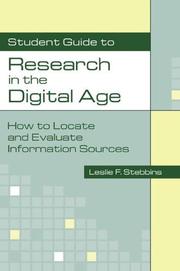
ISBN: 1591580994 Year: 2006 Publisher: Westport, CT ; London Libraries Unlimited
Abstract | Keywords | Export | Availability | Bookmark
 Loading...
Loading...Choose an application
- Reference Manager
- EndNote
- RefWorks (Direct export to RefWorks)
Research --- Information retrieval --- Information resources --- Computer network resources --- Electronic information resource searching --- Library research --- Bibliography --- Report writing --- Recherche --- Recherche de l'information --- Sources d'information --- Information électronique --- Recherche de l'information électronique --- Recherche documentaire --- Bibliographie --- Rapports --- Handbooks, manuals, etc. --- Evaluation --- Methodology --- Guides, manuels, etc --- Guides, manuels, etc. --- Méthodologie --- Rédaction --- 001.891 --- 01 <03> --- Wetenschappelijk onderzoek. Research. Onderzoekmethoden --- Bibliografie als vak; methodologie. Bibliografische diensten--Naslagwerken. Referentiewerken --- Databanken en research --- Internet ( computernetwerken ) --- Literatuuronderzoek --- Online literatuuronderzoek --- Research in bibliotheken --- gidsen --- research --- methodologie --- 01 <03> Bibliografie als vak; methodologie. Bibliografische diensten--Naslagwerken. Referentiewerken --- 001.891 Wetenschappelijk onderzoek. Research. Onderzoekmethoden --- Databanken en research. --- Literatuuronderzoek. --- Online literatuuronderzoek. --- Research in bibliotheken. --- gidsen. --- research. --- methodologie. --- Information électronique --- Recherche de l'information électronique --- Méthodologie --- Rédaction --- Library skills --- Library use skills --- Data retrieval --- Data storage --- Discovery, Information --- Information discovery --- Information storage and retrieval --- Retrieval of information --- Documentation --- Information science --- Information storage and retrieval systems --- Information sources --- Resources, Information --- Sources of information --- Computer searching --- Electronic searching --- Online searching --- Searching electronic information resources --- Internet resources --- Remote access electronic resources --- Remote electronic resources --- Resources, Computer network --- Electronic information resources --- Uniform Resource Identifiers
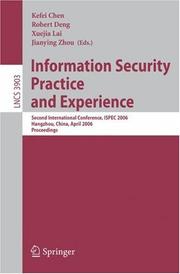
ISBN: 9783540330523 3540330526 3540330585 Year: 2006 Publisher: Berlin ; New York : Springer,
Abstract | Keywords | Export | Availability | Bookmark
 Loading...
Loading...Choose an application
- Reference Manager
- EndNote
- RefWorks (Direct export to RefWorks)
This volume contains the Research Track proceedings of the Second Information Security Practice and Experience Conference 2006 (ISPEC 2006), which took place in Hangzhou, China, April 11–14, 2006. The inaugural ISPEC 2005 was held exactly one year earlier in Singapore. As applications of information security technologies become pervasive, issues pertaining to their deployment and operations are becoming increasingly imp- tant. ISPEC is an annual conference that brings together researchers and pr- titioners to provide a con?uence of new information security technologies, their applications and their integration with IT systems in various vertical sectors. ISPEC 2006 received 307 submissions. This is probably the highest number of paper submissions in any information security-related technical conferences. Due to this exceptionally large number of submissions and the high quality of the submitted papers, not all the papers that contained innovative ideas could be accepted. Each paper was sent to at least three Program Committee m- bers for comments. Based on the reviewers’ comments and discussion by the Program Committee, of the 307 submissions, 35 were selected for inclusion in these proceedings as research track papers and another 21 papers were selected as industrial track papers and are published in the Journal of Shanghai Jiaotong University (Science).
Computer security --- Data protection --- Sécurité informatique --- Protection de l'information (Informatique) --- Congresses. --- Congrès --- Computer networks --- Computer Science --- Engineering & Applied Sciences --- Security measures --- Computer science. --- Computer communication systems. --- Operating systems (Computers). --- Data encryption (Computer science). --- Information storage and retrieval. --- Computers and civilization. --- Management information systems. --- Computer Science. --- Data Encryption. --- Computer Communication Networks. --- Operating Systems. --- Computers and Society. --- Management of Computing and Information Systems. --- Information Storage and Retrieval. --- Computer-based information systems --- EIS (Information systems) --- Executive information systems --- MIS (Information systems) --- Sociotechnical systems --- Information resources management --- Management --- Civilization and computers --- Civilization --- Data encoding (Computer science) --- Encryption of data (Computer science) --- Cryptography --- Computer operating systems --- Computers --- Disk operating systems --- Systems software --- Communication systems, Computer --- Computer communication systems --- Data networks, Computer --- ECNs (Electronic communication networks) --- Electronic communication networks --- Networks, Computer --- Teleprocessing networks --- Data transmission systems --- Digital communications --- Electronic systems --- Information networks --- Telecommunication --- Cyberinfrastructure --- Electronic data processing --- Network computers --- Informatics --- Science --- Communication systems --- Operating systems --- Distributed processing --- Information Systems. --- Information storage and retrieva. --- Cryptology. --- Information storage and retrieval systems. --- Automatic data storage --- Automatic information retrieval --- Automation in documentation --- Data processing systems --- Data storage and retrieval systems --- Discovery systems, Information --- Information discovery systems --- Information processing systems --- Information retrieval systems --- Machine data storage and retrieval --- Mechanized information storage and retrieval systems --- Computer systems --- Electronic information resources --- Data libraries --- Digital libraries --- Information organization --- Information retrieval --- Information retrieval. --- Data retrieval --- Data storage --- Discovery, Information --- Information discovery --- Information storage and retrieval --- Retrieval of information --- Documentation --- Information science --- Information storage and retrieval systems
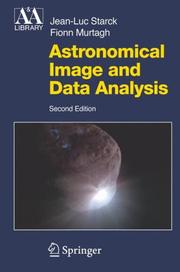
ISBN: 3540330259 3540330240 3642433537 9783540330240 Year: 2006 Publisher: Berlin ; New York : Springer,
Abstract | Keywords | Export | Availability | Bookmark
 Loading...
Loading...Choose an application
- Reference Manager
- EndNote
- RefWorks (Direct export to RefWorks)
With information and scale as central themes, this comprehensive survey explains how to handle real problems in astronomical data analysis using a modern arsenal of powerful techniques. It treats those innovative methods of image, signal, and data processing that are proving to be both effective and widely relevant. The authors are leaders in this rapidly developing field and draw upon decades of experience. They have been playing leading roles in international projects such as the Virtual Observatory and the Grid. The book addresses not only students and professional astronomers and astrophysicists, but also serious amateur astronomers and specialists in earth observation, medical imaging, and data mining. The coverage includes chapters or appendices on: detection and filtering; image compression; multichannel, multiscale, and catalog data analytical methods; wavelets transforms, Picard iteration, and software tools. This second edition of Starck and Murtagh's highly appreciated reference again deals with topics that are at or beyond the state of the art. It presents material which is more algorithmically oriented than most alternatives and broaches new areas like ridgelet and curvelet transforms. Throughout the book various additions and updates have been made.
Data processing. --- Imaging systems in astronomy -- Data processing. --- Imaging systems in astronomy. --- Imaging systems in astronomy --- Astronomy - General --- Astronomical Observatories & Instruments --- Astronomy & Astrophysics --- Physical Sciences & Mathematics --- Data processing --- Astronomical instruments. --- Astronomical imaging systems --- Astronomy --- Instruments, Astronomical --- Instruments --- Physics. --- Database management. --- Information storage and retrieval. --- Observations, Astronomical. --- Statistics. --- Astronomy, Observations and Techniques. --- Statistics for Engineering, Physics, Computer Science, Chemistry and Earth Sciences. --- Statistical Theory and Methods. --- Database Management. --- Information Storage and Retrieval. --- Observations. --- Astronomical instruments --- Optical instruments --- Physical instruments --- Scientific apparatus and instruments --- Space optics --- Mathematical statistics. --- Information storage and retrieva. --- Information retrieval. --- Data retrieval --- Data storage --- Discovery, Information --- Information discovery --- Information storage and retrieval --- Retrieval of information --- Documentation --- Information science --- Information storage and retrieval systems --- Data base management --- Data services (Database management) --- Database management services --- DBMS (Computer science) --- Generalized data management systems --- Services, Database management --- Systems, Database management --- Systems, Generalized database management --- Electronic data processing --- Mathematics --- Statistical inference --- Statistics, Mathematical --- Statistics --- Probabilities --- Sampling (Statistics) --- Statistical analysis --- Statistical data --- Statistical methods --- Statistical science --- Econometrics --- Information storage and retrieval systems. --- Automatic data storage --- Automatic information retrieval --- Automation in documentation --- Computer-based information systems --- Data processing systems --- Data storage and retrieval systems --- Discovery systems, Information --- Information discovery systems --- Information processing systems --- Information retrieval systems --- Machine data storage and retrieval --- Mechanized information storage and retrieval systems --- Computer systems --- Electronic information resources --- Data libraries --- Digital libraries --- Information organization --- Information retrieval --- Astronomy—Observations. --- Statistics . --- Astronomical observations --- Observations, Astronomical --- Imaging systems in astronomy - Data processing
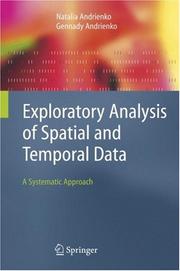
ISBN: 3540259945 9783540259947 9786610608645 1280608641 3540311904 Year: 2006 Publisher: Berlin Springer
Abstract | Keywords | Export | Availability | Bookmark
 Loading...
Loading...Choose an application
- Reference Manager
- EndNote
- RefWorks (Direct export to RefWorks)
Exploratory data analysis (EDA) is about detecting and describing patterns, trends, and relations in data, motivated by certain purposes of investigation. As something relevant is detected in data, new questions arise, causing specific parts to be viewed in more detail. So EDA has a significant appeal: it involves hypothesis generation rather than mere hypothesis testing. The authors describe in detail and systemize approaches, techniques, and methods for exploring spatial and temporal data in particular. They start by developing a general view of data structures and characteristics and then build on top of this a general task typology, distinguishing between elementary and synoptic tasks. This typology is then applied to the description of existing approaches and technologies, resulting not just in recommendations for choosing methods but in a set of generic procedures for data exploration. Professionals practicing analysis will profit from tested solutions – illustrated in many examples – for reuse in the catalogue of techniques presented. Students and researchers will appreciate the detailed description and classification of exploration techniques, which are not limited to spatial data only. In addition, the general principles and approaches described will be useful for designers of new methods for EDA.
Temporal databases. --- Spatial analysis (Statistics) --- Multivariate analysis. --- Bases de données spatio-temporelles --- Analyse spatiale (Statistique) --- Analyse multivariée --- EPUB-LIV-FT LIVINFOR SPRINGER-B --- Computer science. --- Earth sciences. --- Information storage and retrieval. --- Application software. --- Geographical information systems. --- Computer Science. --- Computer Applications. --- Geographical Information Systems/Cartography. --- Earth Sciences, general. --- Information Storage and Retrieval. --- Information systems --- Multivariate distributions --- Multivariate statistical analysis --- Statistical analysis, Multivariate --- Analysis of variance --- Mathematical statistics --- Matrices --- Analysis, Spatial (Statistics) --- Correlation (Statistics) --- Spatial systems --- Temporal data bases --- Databases --- Spatial analysis (Statistics). --- Geography. --- Information storage and retrieva. --- Information retrieval. --- Informatics --- Science --- Cosmography --- Earth sciences --- World history --- Geographical information systems --- GIS (Information systems) --- Information storage and retrieval systems --- Data retrieval --- Data storage --- Discovery, Information --- Information discovery --- Information storage and retrieval --- Retrieval of information --- Documentation --- Information science --- Geography --- Information storage and retrieval systems. --- Automatic data storage --- Automatic information retrieval --- Automation in documentation --- Computer-based information systems --- Data processing systems --- Data storage and retrieval systems --- Discovery systems, Information --- Information discovery systems --- Information processing systems --- Information retrieval systems --- Machine data storage and retrieval --- Mechanized information storage and retrieval systems --- Computer systems --- Electronic information resources --- Data libraries --- Digital libraries --- Information organization --- Information retrieval --- Geosciences --- Environmental sciences --- Physical sciences --- Application computer programs --- Application computer software --- Applications software --- Apps (Computer software) --- Computer software
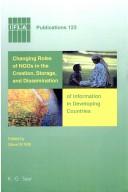
ISBN: 9783598220302 3598220308 9786613403445 3119161527 1283403447 3598440243 Year: 2006 Volume: 123 Publisher: München : K.G. Saur,
Abstract | Keywords | Export | Availability | Bookmark
 Loading...
Loading...Choose an application
- Reference Manager
- EndNote
- RefWorks (Direct export to RefWorks)
Non-governmental organizations (NGOs) are growing exponentially. In 1993, the Yearbook of International Organizations listed 16,000 internationally recognized NGOs. By 2004, this number was 63,000. With this increase comes a staggering growth in the activities and intellectual output of NGOs working on a local and international level. As the mission of both libraries and NGOs increasingly intersect, these organizations must collaborate to provide essential services that revolve around the creation, dissemination, and storage of information. This volume's eight essays focus on collaborative
Documentation and information --- Development aid. Development cooperation --- Developing countries --- 339.96 --- 061.2 --- 334.7 --- BPB0701 --- 334.7 Diverse economische organisatievormen. Particuliere ondernemingen. Semioverheidsbedrijven. Openbare bedrijven. Overheidsbedrijven. Staatsbedrijven. Multinationals. Grootbedrijf. Middenbedrijf. Kleinbedrijf --- Diverse economische organisatievormen. Particuliere ondernemingen. Semioverheidsbedrijven. Openbare bedrijven. Overheidsbedrijven. Staatsbedrijven. Multinationals. Grootbedrijf. Middenbedrijf. Kleinbedrijf --- 061.2 Niet-gouvernementele organisaties. Semi-officiële instellingen. Particuliere instellingen en verenigingen --- Niet-gouvernementele organisaties. Semi-officiële instellingen. Particuliere instellingen en verenigingen --- 339.96 Ontwikkelingshulp. Ontwikkelingssamenwerking. Ontwikkelingsproblematiek --- Ontwikkelingshulp. Ontwikkelingssamenwerking. Ontwikkelingsproblematiek --- Information retrieval. --- Information organization. --- Libraries and community. --- Non-governmental organizations. --- INGOs (International agencies) --- International non-governmental organizations --- NGOs (International agencies) --- Nongovernmental organizations --- Organizations, Non-governmental (International agencies) --- Private and voluntary organizations (International agencies) --- PVOs (International agencies) --- International agencies --- Nonprofit organizations --- Community and libraries --- Communities --- Information storage and retrieval --- Organization of information --- Information science --- Information storage and retrieval systems --- Data retrieval --- Data storage --- Discovery, Information --- Information discovery --- Retrieval of information --- Documentation --- information needs --- Information storage --- information services --- libraries --- library sciences --- Cooperation. --- Cooperation --- Information retrieval --- Information organization --- Libraries and community --- Recherche de l'information --- Organisation de l'information --- Relations bibliothèque-collectivité --- Organisations non-gouvernementales --- Libraries
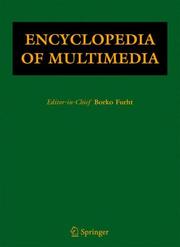
ISBN: 1280618663 9786610618668 0387300384 9780387243955 038724395X 9780387300382 0387335587 Year: 2006 Publisher: New York, N.Y. : Springer,
Abstract | Keywords | Export | Availability | Bookmark
 Loading...
Loading...Choose an application
- Reference Manager
- EndNote
- RefWorks (Direct export to RefWorks)
The Encyclopedia of Multimedia provides in-depth coverage of the important concepts, issues and technology trends in the field of multimedia technologies, systems, techniques, and applications. It is a comprehensive collection of entries that present perspectives and future trends in the field from hundreds of leading researchers and world experts in the field. These entries describe a number of topics in multimedia systems and applications – from multimedia servers, to multimedia databases and multimedia networks and communications, to emerging multimedia applications. The Encyclopedia of Multimedia also includes: The most sought-after topics of multimedia available, including new standards Key citations Cross referenced entries The Editor-in-Chief, working with the Encyclopedia’s Editorial Board and a large number of contributors, surveyed and divided the field of multimedia into specific topics that collectively encompass the foundations, technologies, applications, and emerging elements of this exciting field. The intended audience of the Encyclopedia of Multimedia is technically diverse and wide; it includes everyone concerned with multimedia systems and their applications. Specifically, this volume serves as a valuable reference for system designers, engineers, programmers, and managers who are involved in multimedia system design and their applications. Practitioners in industry and advanced-level students in computer science and engineering will benefit from this book.
Multimedia systems --- Computer-based multimedia information systems --- Multimedia computing --- Multimedia information systems --- Multimedia knowledge systems --- Information storage and retrieval systems --- Multimedia --- Encyclopedias --- Encyclopédies --- EPUB-LIV-FT LIVINFOR SPRINGER-B --- Dictionaries --- Multimedia systems. --- Database management. --- Computer vision. --- Information storage and retrieva. --- Computer Communication Networks. --- Coding theory. --- Multimedia Information Systems. --- Database Management. --- Computer Imaging, Vision, Pattern Recognition and Graphics. --- Information Storage and Retrieval. --- Coding and Information Theory. --- Information storage and retrieval. --- Information retrieval. --- Data compression (Telecommunication) --- Digital electronics --- Information theory --- Machine theory --- Signal theory (Telecommunication) --- Computer programming --- Machine vision --- Vision, Computer --- Artificial intelligence --- Image processing --- Pattern recognition systems --- Data base management --- Data services (Database management) --- Database management services --- DBMS (Computer science) --- Generalized data management systems --- Services, Database management --- Systems, Database management --- Systems, Generalized database management --- Electronic data processing --- Data retrieval --- Data storage --- Discovery, Information --- Information discovery --- Information storage and retrieval --- Retrieval of information --- Documentation --- Information science --- Information storage and retrieval systems. --- Automatic data storage --- Automatic information retrieval --- Automation in documentation --- Computer-based information systems --- Data processing systems --- Data storage and retrieval systems --- Discovery systems, Information --- Information discovery systems --- Information processing systems --- Information retrieval systems --- Machine data storage and retrieval --- Mechanized information storage and retrieval systems --- Computer systems --- Electronic information resources --- Data libraries --- Digital libraries --- Information organization --- Information retrieval --- Multimedia information systems. --- Optical data processing. --- Computer communication systems. --- Information theory. --- Communication theory --- Communication --- Cybernetics --- Communication systems, Computer --- Computer communication systems --- Data networks, Computer --- ECNs (Electronic communication networks) --- Electronic communication networks --- Networks, Computer --- Teleprocessing networks --- Data transmission systems --- Digital communications --- Electronic systems --- Information networks --- Telecommunication --- Cyberinfrastructure --- Network computers --- Optical computing --- Visual data processing --- Bionics --- Integrated optics --- Photonics --- Computers --- Distributed processing --- Optical equipment
| Listing 1 - 10 of 10 |
Sort by
|

 Search
Search Feedback
Feedback About UniCat
About UniCat  Help
Help News
News